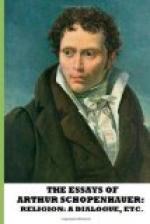path, and therefore, the greater the force, impetus
and passion, which spurs on the will from within,
the more complete and luminous must be the intellect
which is attached to it, that the vehement strife of
the will, the glow of passion, and the intensity of
the emotions, may not lead man astray, or urge him
on to ill considered, false or ruinous action; this
will, inevitably, be the result, if the will is very
violent and the intellect very weak. On the other
hand, a phlegmatic character, a weak and languid will,
can get on and hold its own with a small amount of
intellect; what is naturally moderate needs only moderate
support. The general tendency of a want of proportion
between the will and the intellect, in other words,
of any variation from the normal proportion I have
mentioned, is to produce unhappiness, whether it be
that the will is greater than the intellect, or the
intellect greater than the will. Especially is
this the case when the intellect is developed to an
abnormal degree of strength and superiority, so as
to be out of all proportion to the will, a condition
which is the essence of real genius; the intellect
is then not only more than enough for the needs and
aims of life, it is absolutely prejudicial to them.
The result is that, in youth, excessive energy in
grasping the objective world, accompanied by a vivid
imagination and a total lack of experience, makes
the mind susceptible, and an easy prey to extravagant
ideas, nay, even to chimeras; and the result is an
eccentric and phantastic character. And when,
in later years, this state of mind yields and passes
away under the teaching of experience, still the genius
never feels himself at home in the common world of
every day and the ordinary business of life; he will
never take his place in it, and accommodate himself
to it as accurately as the person of moral intellect;
he will be much more likely to make curious mistakes.
For the ordinary mind feels itself so completely at
home in the narrow circle of its ideas and views of
the world that no one can get the better of it in
that sphere; its faculties remain true to their original
purpose, viz., to promote the service of the
will; it devotes itself steadfastly to this end, and
abjures extravagant aims. The genius, on the
other hand, is at bottom a monstrum per excessum;
just as, conversely, the passionate, violent and unintelligent
man, the brainless barbarian, is a monstrum per
defectum.
* * * * *
The will to live, which forms the inmost core of every living being, exhibits itself most conspicuously in the higher order of animals, that is, the cleverer ones; and so in them the nature of the will may be seen and examined most clearly. For in the lower orders its activity is not so evident; it has a lower degree of objectivation; whereas, in the class which stands above the higher order of animals, that is, in men, reason enters in; and with reason comes discretion,




